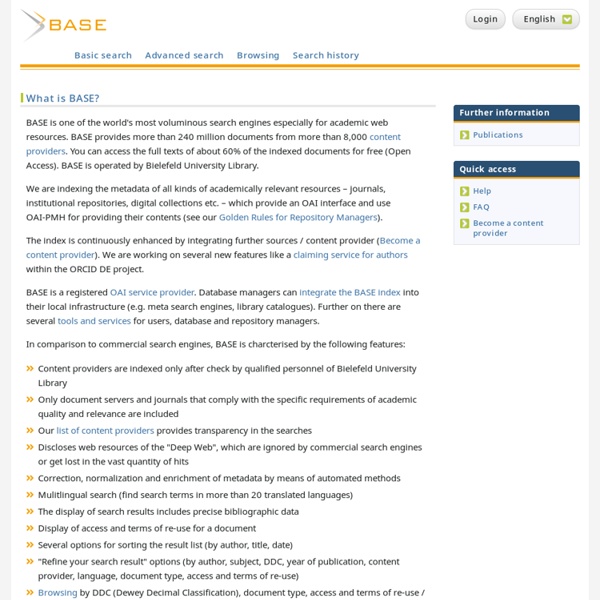



101 Free Online Journal and Research Databases for Academics | Scribendi Introduction Has this ever happened to you? While researching an important paper, you come across an online journal database that claims to connect academics to high-quality peer-reviewed research. Subscription fees and paywalls are often the bane of students and academics, especially those at small institutions who don't have access to many article directories and repositories. Whether you're working on an undergraduate paper, a PhD dissertation, or a medical research study, we want to help you find tools to locate and access the information you need to produce well-researched, compelling, and innovative writing. Check out the top 21 free online journal and research databases in this article, and click the link below to download the full list of 101 databases, completely free! The Top 21 Free Online Journal and Research Databases CORE is a multidisciplinary aggregator of open access research. 2. 3. 4. 5. arXiv e-Print Archive 6. 7. 8. 9. 10. 11. 12. 13. dblp Computer Science Bibliography
Paperity - Multidisciplinary aggregator of Open Access journals & papers | Paperity Open Access Journals Search Engine (OAJSE) Open access journals | Open Science Acta Orthopaedica et Traumatologica TurcicaActa Orthopaedica et Traumatologica Turcica (AOTT) publishes diagnostic, treatment, and prevention methods related to orthopedics and traumatology and original studies in related disciplines. Contributions may be in the form of clinical and basic… Acta Pharmaceutica Sinica BActa Pharmaceutica Sinica B (APSB) is a bimonthly journal, in English, which publishes significant original research articles, rapid communications and high quality reviews of recent advances in all areas of pharmaceutical sciences — including… Addictive Behaviors ReportsAddictive Behaviors Reports is an open-access and peer reviewed online-only journal offering an interdisciplinary forum for the publication of research in addictive behaviors. Advances in Radiation OncologyAdvances in Radiation Oncology is a peer reviewed, wide-ranging open access journal from the American Society for Radiation Oncology (ASTRO). HeliyonHeliyon welcomes research across all disciplines.
Search Contents of Open Access Repositories Search Repository Contents This service, based on the Google Custom Search engine, lets you search the contents of the repositories listed in OpenDOAR for freely available academic research information. This quality assured approach minimises (but does not eliminate!) spurious or junk results, and leads more directly to useful and relevant information. This service relies on Google's indexes, which in turn rely on repositories being suitably structured and configured for the Googlebot web crawler.
Encyclopedia Britannica List of academic databases and search engines - Wikipedia From Wikipedia, the free encyclopedia This article contains a representative list of notable databases and search engines useful in an academic setting for finding and accessing articles in academic journals, institutional repositories, archives, or other collections of scientific and other articles. Databases and search engines differ substantially in terms of coverage and retrieval qualities.[1] Users need to account for qualities and limitations of databases and search engines, especially those searching systematically for records such as in systematic reviews or meta-analyses.[2] As the distinction between a database and a search engine is unclear for these complex document retrieval systems, see: the general list of search engines for all-purpose search engines that can be used for academic purposesthe article about bibliographic databases for information about databases giving bibliographic information about finding books and journal articles. Operating services[edit] [edit] [edit]
Open Access | Journals OUP supports Open Access Oxford University Press (OUP) is mission-driven to facilitate the widest possible dissemination of high-quality research. We embrace both green and gold open access (OA) publishing to support this mission. A proven track record of success OUP has been publishing OA content since 2004. We have also successfully launched or taken over high-quality OA titles, including: Genome Biology and Evolution, Journal of Legal Analysis, Progress of Theoretical and Experimental Physics, and Database. OUP facilitates green OA either by allowing authors to deposit versions of their manuscripts in institutional or subject repositories after a specified time period, or depositing the version of record on their behalf. Supporting the evolution of Open Access publishing Sustainable, high-quality OA publishing requires either funding to be available to pay for Article Processing Charges, sponsorship, or suitable embargo periods. OUP operates two different open access models: OA at OUP
Home - US IB Extended Essay - LibGuides at American School of Madrid Academic honesty in the IB educational context Most students understand that it is wrong to copy another student's work and submit as their own. However, it is also dishonest to copy and paste text from WWW into your paper and submit as your own writing or ideas. Academic Honesty The Plagiarism.org website provides some helpful information on intentional and unintentional plagiarism, and on how students can avoid plagiarism by good citation. Paraphrasing can be difficult, and the Indiana University Writing Tutorial Services provides some helpful information on how to properly paraphrase. Citing Sources for Academic Research When doing research for papers and projects, it is necessary to properly acknowledge authors whose work has been used in your end product. PlagiarismPlagiarism is often clear to students only when it involves non-electronic sources. Copyright law protects Web documents.
Free Research Databases | Free Academic Databases | EBSCO « Home » Who We Serve » Academic Libraries »Subjects » Free Databases Research Databases American Doctoral Dissertations This free research database indexes thousands of theses and dissertations accepted by American universities from 1902 to the present and provides links to full text, when available. GreenFILE • full text This free research database provides scholarly, government and general-interest sources covering the environmental effects of individuals, corporations and governments and what can be done at each level to minimize negative impacts. Library, Information Science and Technology Abstracts This free research database provides indexing and abstracting for key library and information science journals, books, research reports and more. Teacher Reference Center A complimentary research database for teachers, Teacher Reference Center (TRC) provides indexing and abstracts for more than 220 peer-reviewed journals. Historical Digital Archives European Views of the Americas: 1493-1750 Blogs